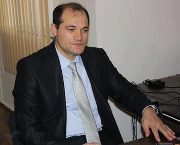Almost all our positions coincide with those of the Venice Commission
The Azerbaijani pro opposition forum “Public Chamber” will this week hold a round table discussion on the electoral code of Azerbaijan. Ahead of the meeting CEWs Karina Gould interviewed Razi Nurullayev, the Deputy-chairperson for Foreign Affairs of the Popular Front Party of Azerbaijan and Chairman of the Board of Directors at “REGION” International Analytical Centre (RIAC).
CEW: What is the motivation behind the organization of the round table discussions this upcoming week?
RN: The round table discussions will take place on 21 June, 2012 in Baku and are being organized by the pro-democracy opposition group, the Public Chamber of Azerbaijan (PC). The PC emerged in the aftermath of the October 2010 Parliamentary Elections in Azerbaijan, which left all of the major opposition parties outside of the legislative body without a single seat due to electoral fraud. The PC is taking on this initiative because it is able to bring together most of the political parties, civil society, experts, academics and individual activists in Azerbaijan.
CEW: Who do you hope will attend the round table and why is their participation important?
RN: The round table is open to all political parties, civil society, NGOs, independent experts and ruling authorities. Invitations have already been sent to all of the above-mentioned groups and special invitations are also being sent to international missions, embassies and other relevant bodies in Azerbaijan.
The Public Chamber is trying to bring together all of the interested bodies and stakeholders in order to represent all of the interests and prepare one single document with the suggested amendments.
Usually there are several political parties and civil society organizations which prepare different papers that are sent out to the Council of Europe, the Organisation for Security and Cooperation in Europe (OSCE), and the Parliamentary Assembly of the Council of Europe (PACE) as well as other relevant international bodies. Given the involvement of so many stakeholders it can be difficult to balance the different points of view and interests. The round table will try and streamline the comments and interests of the various actors involved in the process. Once there is one single document, it will be much easier to publish it and work together to achieve the amendments.
CEW: Could you outline the amendments that are being proposed to the Electoral Code and what impacts these might have on the upcoming elections in Azerbaijan?
RN: The Venice Commission of the Council of Europe prepared the proposed amendments and sent them around to the relevant bodies in Baku. However, so far the major amendments offered by the Venice Commission, the Azerbaijani political parties as well as electoral NGOs have not been adopted.
Recently, the parliament of Azerbaijan made several technical amendments to the Electoral Code of Azerbaijan; however, they do not appear to be sufficient enough to contribute to greater transparency in the forthcoming elections.
Almost all of our positions coincide with the terms proposed by the Venice Commission. These include the need for equal representation of political parties in the composition of the Central Election Commission and other subsequent commissions at the local levels. The PC believes that no elections in Azerbaijan could potentially be free and just without an equal composition of the electoral commissions.
Another concern is about election observation and electoral complaints. As it currently stands, the law does not provide sufficient legal and practical grounds for effective observation missions. Observers are not allowed to observe the counting of ballot papers and must stand a certain distance away from the counting table. In reality and in practice, observers are unable to see the voting marks beside the names of the candidates and thus unable to evaluate the vote counting procedure.
CEW: What do you hope will be discussed and achieved during the round table talks?
RN: The major issues to be discussed will be the allocation of the electoral amendments made by the PCs into separate working groups.
There are only 15 months left until the next presidential election in Azerbaijan. The PC hopes to achieve amendments in the Electoral Code of Azerbaijan before the presidential elections in the autumn of 2013.
The PC wishes to coordinate all of the efforts from civil society, political parties and experts. If the current Electoral Code remains in place as it is now, there will be no scope to go to presidential elections. Time is therefore of the essence and we need to submit all our proposed amendments in due time to the Venice Commission and the OSCE.
The round table will define the directions of the suggested amendments. It is possible that we will also establish special commissions who will prepare the suggestions for each set of amendments.
CEW: To whom will you be submitting the conclusions of the round table discussions?
RN: Once the unified document has been fully prepared with the set of recommendations to the Electoral Code, it will be sent to the Office of the President, Parliament, the Central Election Commission and international organizations, including the Venice Commission, OSCE, EU, and European Embassies accredited to Azerbaijan.
source: CEW
